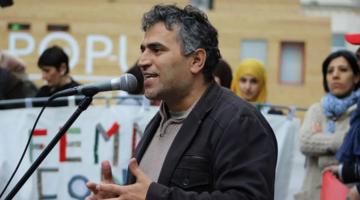Transnational black solidarity has been a central component of African American roots tourism in Brazil, even as international tourism also allows for the enactment of first-world subjectivities.
“People have been fiercely mobilizing across classes, races, genders, nations, and generations to defeat the reactionary wave.”
In this series, we ask acclaimed authors to answer five questions about their book. This week’s featured author is Patricia de Santana Pinho. Pinho is Associate Professor of Latin American and Latino studies at University of California, Santa Cruz. Her book is Mapping Diaspora: African American Roots Tourism in Brazil.
Roberto Sirvent: How can your book help BAR readers understand the current political and social climate?
Patricia Pinho: Brazil is undergoing the worst political crisis of its recent history. Misogyny, homophobia, racism, and a strong anti-poor sentiment have contributed to the materialization of three recent shocking events: the “soft coup” that ousted our first female president, Dilma Rousseff, in 2016; the imprisonment of former president Luiz Inácio “Lula” da Silva on unfounded charges in early 2018; and the election of the neo-fascist Jair Bolsonaro in late 2018. It seems impossible not to describe the current dismantling of Brazil’s welfare state and the overall attack on the hard-won rights of women and the Afro-Brazilian and Indigenous populations as a colossal regression. The overpowering sense that we are walking backwards, after a period of prosperity and wealth distribution, and receding to a previous or less advanced stage of the country’s development has informed the leftist analyses of the recent turn of events. Appalled by my country’s sudden reversion, I have caught myself employing the same evolutionist language that I have been critical of in my book, in reference to tourism discourses of the Other.
Despite our urge to define the new depressing reality as a regression, I hope that my book might inspire us to disengage from evolutionist reasoning. Because it relies on a linear conception of history, evolutionism prioritizes some actors, elements, and processes to the detriment of others, instead of providing a more complex and inclusive framework. History is better understood, however, as a series of nodes, where multiple processes take place simultaneously, and, above all, where multiple and often times opposing actors dispute the very meaning of progress as well as to whom its gains should be extended. Although examining a different context, I argue in my book that evolutionist explanations are unproductive, even when they seem appealing, and that we need alternative ways to explain reality, that move us beyond hierarchical and Eurocentric logics.
What do you hope activists and community organizers will take away from reading your book?
I hope that my book may stimulate a critical reflection about how we tend to inadvertently reproduce hierarchies, even in relations that are meant to take place among equals, that is, with those with whom we share “sameness.” This is especially the case in transnational contexts, where the national component of one’s identity may conflict with other components, such as race, gender, and sexuality. Members of an identity group often seek out members of comparable groups in other countries because they have similar histories of oppression, exclusion, and discrimination that revolve around their common race, gender, or sexuality. Yet, as these communities interact with one another, usually with the goal of establishing solidarity and mutual support, the asymmetries that result from their respective national affiliations may affect the horizontality of their relations. This has occurred, for example, in women’s transnational movements, global LGBTQ activism, and black internationalism, when members of groups from the Global North may see themselves as the guiding light for their Global South counterparts.
In the context that I examine in my book, African American roots tourists are very aware of their power as U.S. citizens, and they have actively “made use” of their identity, as both tourists and Americans, to support Afro-Brazilians. In addition to donating cash and goods and providing financial support for Afro-Brazilian organizations, they have often requested black tourist guides and prioritized patronizing black-owned businesses so that their U.S. dollars are channeled to Afro-Brazilians. The lobbying of African Americans on behalf of Afro-Brazilians has generated very positive results, but it is often accompanied by a discourse that establishes a leadership role for African Americans in the “advancement” of Afro-Brazilians. While I am a firm believer (and participant) in projects of transnational solidarity, I find it important that we stay alert to how first-world subjectivities may be enacted in transnational encounters.
We know readers will learn a lot from your book, but what do you hope readers will un-learn? In other words, is there a particular ideology you’re hoping to dismantle?
As I mentioned in response to the first question, I hope that my book may help us un-learn and disengage from evolutionism. As I carried out the research for my book, it became increasingly clear to me how deeply evolutionism and evolutionist logics are ingrained in our thinking, and that we must make a great effort to denaturalize them. In addition to the hierarchies it establishes between the present and the past, the Self and the Other, the West and the Rest, evolutionism is also inherently masculinist. Because it uses time to classify difference, presupposing that peoples evolve from less to more advanced stages, evolutionism relies on the naturalization of the masculine action of time over a static and feminine notion of space or place.
The civilizing logic of Western discourses of evolution, as well as other epistemologies originated in the Enlightenment, are profoundly gendered and grounded on patriarchal presuppositions that have relied on the implicit assumption of the masculine self, usually but not necessarily white, as the neutral standard against which the feminized Other, usually but not necessarily women, should be measured. In that sense, I hope that my book may be useful also for the denaturalization of gender, which is also profoundly ingrained in our understanding of ourselves, of others, and the world around us. To understand gender as culturally constructed does not mean pretending it does not exist; on the contrary, it means being alert to how intensely gender informs and sustains our material reality. In my book I discuss the gendered dimensions of tourism and how it differently shapes not only women’s and men’s experiences of travel, but also how they conceive of their roles and responsibilities toward their communities at home as well as the broader black diaspora.
Who are the intellectual heroes that inspire your work?
My major intellectual heroes are the folks who are fighting racism, sexism, imperialism, and all forms of oppression on the ground, including the black activists that I interviewed for my book. As leftists, we tend to think of ourselves as divided into those who do the abstract, intellectual work, and those who do the practical, activist work. But the activists that I know are intellectuals, independently of whether they had access to formal education. And the intellectuals with whom I align myself are scholar-activists.
One of my favorite intellectuals is Jamaican-British Cultural Studies scholar Stuart Hall. I truly appreciate his ability to make accessible ideas that are usually quite difficult to grasp. I love his take on the relevance of theory: while we cannot fully understand the world without it, theory should not be treated as dogma. To paraphrase Hall: The only theory worth having is that which you have to fight off, and not the one you find yourself thoughtlessly regurgitating. Hall deeply inspires my teaching and writing.
A more recent intellectual sheroe of mine is Marielle Franco, a socialist, Afro-Brazilian, LGBTQ activist, who was born and raised in a favela in Rio de Janeiro, and was elected councilwoman in 2016. On March 14, 2018, Marielle Franco was brutally murdered in what ongoing investigations indicate was a premeditated crime carried out by Rio’s militiamen. Franco was a human rights activist and vocal about police violence and its targeting of poor black youth. On the night of her killing, she had just attended a gathering of black women called Jovens Negras Movendo as Estruturas (Young Black Women Shaking the [Power] Structures), where black feminist theory was discussed as a crucial tool to dismantle class, gender, and racial oppression.
Despite belonging to different genders, nations, and generations, Stuart Hall and Marielle Franco had in common their passionate belief that another world is possible, and that intellectual and activist work are, ultimately, one and the same.
In what way does your book help us imagine new worlds?
I deeply believe that another world is possible. This is much more than a slogan; it is the premise that drives my life, both professionally and personally: it inspires my research, writing, and teaching as well as my parenting and overall loving. The belief that another world is possible is especially important in difficult moments such as the one we currently find ourselves in, when racism, sexism, and homophobia, have not only unashamedly raised their ugly heads, but have managed to make their way into people’s hearts and minds to the point of electing beasts as heads of states.
One of the encouraging outcomes of this difficult moment, though, is that people have been fiercely mobilizing across classes, races, genders, nations, and generations to defeat the reactionary wave and with the goal of establishing a new, inclusive, progressive, and better world. In solidarity with Brazilians, many tourists have taken to social media to announce that they will be boycotting Brazil for as long as it is ruled by a neo-fascist whose election has tainted the image of the country. On the other hand, there are those for whom traveling to Brazil and supporting Brazilians to travel abroad, either temporarily or permanently, have become increasingly important resistance strategies. For the Brazilians who do not have the choice of leaving or who have made the decision to stay, international solidarity, in whatever way it travels or impacts travel, will be a crucial resource for the years to come.
As I show in my book, African Americans, as a historically oppressed minority in the United States, have been at the forefront in establishing links of solidarity with subjugated communities around the world, and especially so with their counterparts in the black diaspora. Solidarity projects have been a crucial component of African American roots tourism in Brazil. In my research, I was heartened to witness the transformative power of solidarity and its capacity to forge commonality across difference.
Roberto Sirvent is Professor of Political and Social Ethics at Hope International University in Fullerton, CA. He also serves as the Outreach and Mentoring Coordinator for the Political Theology Network. He is co-author, with fellow BAR contributor Danny Haiphong, of the new book, American Exceptionalism and American Innocence: A People’s History of Fake News—From the Revolutionary War to the War on Terror.
COMMENTS?
Please join the conversation on Black Agenda Report's Facebook page at http://facebook.com/blackagendareport
Or, you can comment by emailing us at comments@blackagendareport.com



















